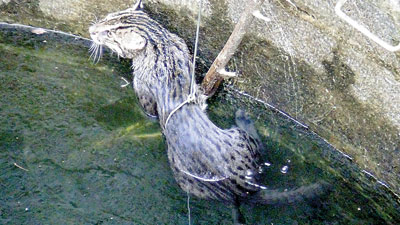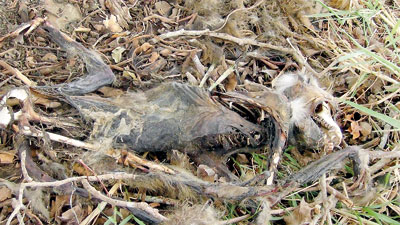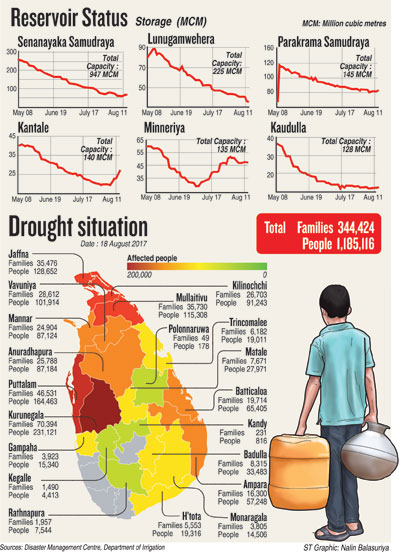News
Desperate national parks battle poachers, curtail safaris and campers
National wildlife parks are struggling with an increase in poaching and are limiting access to safari operators and campers amid a devastating drought.

A fishing cat (handun diviya) was rescued last morning when the desperate animal in search of water had fallen into a well in Digampathana, Dambulla . Pic by K. Kanchana Kumara Ariyadasa
The Yala National Park may even be closed to visitors next month.
There have been reports of animals poisoned at watering holes by poachers at various national parks.
Despite the drought, wildlife officials also say they will provide water only if necessary and instead allow nature to take its course.
Safari jeep operators are complaining of restrictions imposed on them.
The director general of the Department of wildlife Conservation, M G C Sooriyabandara said, park wardens are given the discretion to manage the situation and reduce safari vehicles entering the parks. “Even a one way system has been devised to reduce the same vehicles running up and down,” he said.
He said that the Yala National Park will be closed in September.
Mr Sooriybandara said that officials will rarely intervene in nature and will provide water only if it necessary.
“When we provide water, we choose tanks and watering holes near the safari trails regularly visited by tourists to attract animals, and to make sure that the regularly monitored area is secure from poachers.’’
He said joint patrols are undertaken against wildlife poachers. Wildlife range offices near national parks provide two officials from each office to combine with park rangers and form teams of 10 to carry out raids.
Meanwhile, park rangers and wardens have prepared their own plans.
The warden of the Wilpattu National Park, Chamath Lakshman Perera, said only 30 safari jeeps are allowed at a time, between 6:00 am and 10:00 and then from 2 p.m. to 6 p.m.Mr Perera added that both bungalows and campsites have been closed.
He said 28 small water tanks are being filled up using tanker trucks.
“Lots of poaching activities are happening during the dry months, so we reduce the safari jeeps,’’ he said.
Recently, they detected 13 trap guns and captured four armed men.
A wildlife official said the Yala National Park will be closed next month and will be re-opened after October.
Buddika Widanage, warden at Gal Oya National Park, said it was not badly affected by the drought thanks to the Senanayaka Samudraya. But he said the water levels in the reservoir had dropped.

Thabbowa sanctuary: Fast turning into a graveyard for wild animals. Pic by Hiran Priyankara
He said park rangers and officials of the nearby wildlife offices carry out night patrols to catch poachers who set up trap guns or leave poisoned food at watering holes.
Mr Widanage also said campers are only allowed if they bring their own water.
“Even the three-hour boat rides have been cut to two hours” he said.
The Minneriya Park has suffered from the drought since last year, warden Bhathiya Madugalle said. Elephants are the worst effected — less than 10 remain in the park. Animals have moved to Kandalama Park and Ritigala Eco Park.
Mr Mudalige said that there is also less elephant grass.
He explained that water and food are not provided to animals so that the natural balance is maintained and to allow for the survival of the fittest.
Meanwhile, the Independent Safari Jeep Drivers Association claims unfair treatment.
The head of the group, P D Keerthi, said most parks had reduced access. He claimed the operators could provide water and food for anim,als but wildlife officials and the minister would not allow it.
Mr Keerthi also said the one way drive system for safari jeeps could be dangerous in the event of an attack by elephants, when reversing is the only choice.
He complained that although they are regulated, VIPs are allowed roam in the parks day and night.


